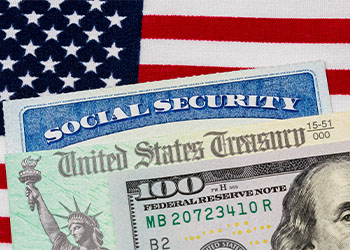Does Bankruptcy Affect Social Security Income?
Oct. 24, 2023
 Are you considering filing for bankruptcy but worried that it will have an effect on your Social Security income? You’re not alone. Many people worry that bankruptcy will make them ineligible for benefits, and as a result, they put off taking action until their financial situation worsens beyond repair.
Are you considering filing for bankruptcy but worried that it will have an effect on your Social Security income? You’re not alone. Many people worry that bankruptcy will make them ineligible for benefits, and as a result, they put off taking action until their financial situation worsens beyond repair.
But the truth is, declaring bankruptcy should not affect your Social Security income. In this blog post, we'll break down how legal debts are treated under different bankruptcies and explain how filing for bankruptcy can help you seek debt relief while protecting your Social Security income stream.
A bankruptcy attorney can provide valuable advice tailored to your specific situation. When you're ready to discuss your case, contact Vivona Pandurangi, PLC, a trusted bankruptcy firm with locations in Falls Church and Alexandria, Virginia. Your first consultation is free.
Explaining Bankruptcy and Its Exemptions
Bankruptcy is a legal process that provides relief to individuals or businesses who are unable to pay their debts. It's a system of laws designed to give debtors a fresh start and creditors a fair share of available assets, based on the debtor's ability to pay.
There are several types of bankruptcy, each referred to as a "chapter," which is a reference to the specific chapter of the Bankruptcy Code under which the case is filed.
If you're in a dire financial situation and considering filing for bankruptcy, you might be worried about losing your valuable assets, including your Social Security benefits. The good news is that there are specific exemptions in bankruptcy laws that protect certain assets. Social Security is an example of an exempt property. So, if you're wondering "Will I lose my social security benefits if I file for bankruptcy?", you can rest assured that your benefits will be protected.
A bankruptcy attorney can offer guidance and help you understand all the exemptions that apply to your particular financial situation.
The Different Types of Bankruptcy and Their Impact on Social Security Benefits
Filing for bankruptcy can be a daunting decision, but understanding the different types of bankruptcy can help you make an informed choice. Two common types of bankruptcy include Chapter 7 and Chapter 13 bankruptcy.
Chapter 7 bankruptcy is often referred to as a "liquidation" bankruptcy and involves selling off non-exempt assets to pay off debts. Social Security benefits remain untouched. They are not considered part of the bankruptcy estate due to their exempt status, and therefore, cannot be used to satisfy debts.
On the other hand, Chapter 13 bankruptcy is known as "reorganization" bankruptcy where debt payments are restructured over a period of time. As exempt property, your Social Security benefits will not factor into the calculation of disposable income that is used to determine your payment amount.
This protection of Social Security benefits in bankruptcy cases speaks to the purpose of these benefits: to provide a safety net for individuals who have retired or are unable to work. It also aligns with the intent of bankruptcy laws, which is to give debtors a fresh start while ensuring fair treatment of creditors.
Understanding the Eligibility Requirements for Social Security Benefits After Bankruptcy
After filing for bankruptcy, the last thing anyone wants to worry about is financial stability in the future. That's why it's important to understand the eligibility requirements for Social Security benefits after bankruptcy.
Keep in mind that bankruptcy does not automatically disqualify you from receiving benefits, but there are some factors to take into consideration. For starters, you must have worked long enough and paid Social Security taxes to qualify for benefits. Additionally, if you're receiving disability benefits, bankruptcy won't affect your overall eligibility.
Take the time to research and understand the rules and regulations to ensure you're able to access the financial assistance you may need down the road. Bankruptcy is a significant decision, but with the right information and support, you can make the choice that best suits your circumstances and take control of your financial future.
Avoid Commingling Funds
While your Social Security benefits are safe, it's important to keep them separate from other funds. Commingling Social Security funds with other money could potentially complicate their exemption status. Many people make this mistake of mixing personal finances with business finances, which can lead to a host of problems that can impact not only your financial stability, but also your legal and tax liabilities.
More specifically, those who receive Social Security benefit income need to be especially mindful of commingling funds because it could potentially disqualify them from receiving these critical benefits. With so much at stake, it's important to keep personal finances and business finances separate to ensure that everyone stays on the right track.
Find Your Best Path Forward
Filing for bankruptcy when receiving social security can be a difficult decision to make. On one hand, it can provide relief from overwhelming debts and financial burdens. On the other, it can have long-lasting effects on credit and future borrowing opportunities.
It's important to consider all options before making a decision, including seeking financial counseling and exploring alternatives to bankruptcy. Ultimately, the decision to file for bankruptcy should be made with careful consideration and professional guidance to ensure the best outcome for your unique situation.
Having a solid understanding of the types of bankruptcies and their impact on Social Security benefits will help you determine the best course to take. An experienced bankruptcy attorney can educate you on your options and help you make important decisions with confidence. Vivona Pandurangi, PLC is here to help you seek a secure future.
With offices in Falls Church and Alexandria, Virginia, they serve clients across Manassas, Arlington County, Fairfax County, Prince William County, and Loudon County.
